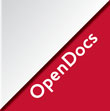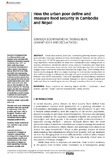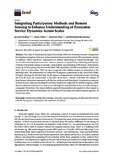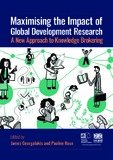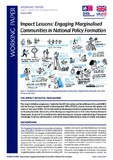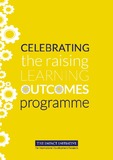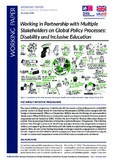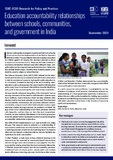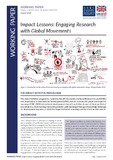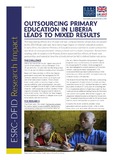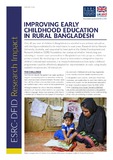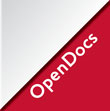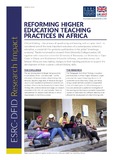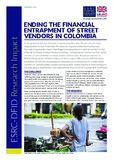Impact Initiative: Recent submissions
Now showing items 381-400 of 778
-
Violent Conflict Implications of Mega Projects in Nyangatom Woreda, Ethiopia
(OTuRN, 2019)This briefing note explores conflict in the past 10 years in the Nyangatom Woreda of South Omo Zone, South-ern Nations Nationalities and Peoples’ region, Ethiopia. The Nyangatom are one of the 16 ethnic groups indig-enous ... -
Flood Retreat Agriculture in the Lower Omo Valley, Ethiopia
(OTuRN, 2019)Flood retreat farming is a technique of farming that relies on the annual flood of rivers to provide irrigation water. It has been practiced in many river basins in Africa, including the Awash, Niger, Nile, and Zambezi. ... -
How the Urban Poor Define and Measure Food Security in Cambodia and Nepal
(SAGE, 2019)Urban food security, or its lack, is attracting growing interest in global policy debates. Glaringly missing in these conversations, however, are the voices of the urban poor. To fill this gap, grassroots community ... -
Integrating Participatory Methods and Remote Sensing to Enhance Understanding of Ecosystem Service Dynamics Across Scales
(MDPI, 2019)The value of Traditional Ecological Knowledge (TEK) for informing resource management has long been recognized; however, its incorporation into ecosystem services (ES) assessments remains uncommon. Often “top-down” approaches ... -
Mise en scène familiale, usages du savoir et campagnes politiques : Djiguiba Camara (Guinée)
(Cahiers d’Études africaines, 2019)Cet article retrace le parcours de Djiguiba Camara, intermédiaire colonial de Haute Guinée et auteur d’un tapuscrit de 110 pages intitulé « Histoire locale » sur l’histoire de son village natal de Damaro et sur Samori ... -
The Lion's Share: An Experimental Analysis of Polygamy in Northern Nigeria
(The University of Chicago Press, 2019)We use simple public goods games to investigate spousal behavior in Kano, northern Nigeria, one of the modern heartlands of polygyny. Most partners keep back at least half of their endowment from the common pool, but we ... -
Multiple Environmental Shocks Impacting Livelihoods and Food Security in Nyangatom, the Lower Omo, Ethiopia
(OTuRN, 2019-08)This briefing note presents preliminary results from the research project ‘Shifting In/equality Dynamics in Ethiopia: from Research to Application’ (SIDERA), which aims to understand the links between envi-ronmental change, ... -
Spousal Control and Efficiency of Intra-household Decision-Making: Experiments among Married Couples in India, Ethiopia and Nigeria
(Springer Nature, 2019)Given the importance of the household as a resource allocation mechanism, considerable interest exists in its efficiency. Most of the non-experimental evidence for inefficiency comes from West African farm households in ... -
Maximising the Impact of Global Development Research – A New Approach to Knowledge Brokering
(Institute of Development Studies, 2021-02)This report, by the Impact Initiative for International Development Research, provides an approach for brokering evidence across large research investments. It is based on six years of work undertaken by the Institute of ... -
Impact Lessons: Engaging Marginalised Communities in National Policy Formation
(IDS and the Impact Initiative, 2021-01)Explores six key benefits of involving marginalised groups in national policy formation which emerged from the Impact Initiative's ‘Engaging Marginalised Communities in National Policy Formation’ virtual event in June 2020. ... -
Celebrating the Raising Learning Outcomes Programme
(Institute of Development Studies and the Impact Initiative, 2020-11)This booklet profiles a selection of the research and impact funded by the ESRC-FCDO Strategic Partnership through the Raising Learning Outcomes in Education Systems Research Programme. This collection of resources highlights ... -
Working in Partnership with Multiple Stakeholders on Global Policy Processes: Disability and Inclusive Education
(REAL Centre, University of Cambridge and The Impact Initiative, 2020-11)Given that policies, programmes, and research focusing on disability in relation to other forms of disadvantage has never been higher on the agenda, it is an opportune moment to identify how new evidence being generated ... -
Covid-19: Thinking Differently about Education Research Impact
(REAL Centre, University of Cambridge and The Impact Initiative, 2020-10)This paper draws on lessons from a webinar organised by the Impact Initiative that explored how researchers need to think differently about impact for education policy and practice in the context of Covid-19. It provides ... -
ESRC-FCDO Research for Policy and Practice: Education Accountability Relationships Between Schools, Communities, and Government in India
(REAL Centre, University of Cambridge and The Impact Initiative, 2020-09)Despite widespread recognition of the challenge to improve learning outcomes and the need to shift education systems away from traditional input orientation, there has been relatively little attention paid to how basic ... -
Impact Lessons: Engaging Research with Global Movements
(Institute of Development Studies and The Impact Initiative, 2020-08)This working paper highlights the key points and emerging policy themes arising from a virtual event hosted by the Global Coalition Against Child Poverty (GCACP) and the Impact Initiative in May 2020. The event concentrated ... -
Outsourcing Primary Education In Liberia Leads To Mixed Results
(REAL Centre, University of Cambridge and The Impact Initiative, 2020-08)The long-lasting effects of a 14-year civil war, compounded by school closures caused by the 2014 Ebola outbreak, have had a huge impact on Liberia’s education system. In early 2016, the Liberian Ministry of Education ... -
Improving Early Childhood Education in Rural Bangladesh
(REAL Centre, University of Cambridge and The Impact Initiative, 2020-08)Only 40 per cent of children in Bangladesh are enrolled in pre-primary education, with this figure estimated to be much lower in rural areas. Research led by Monash University, Australia, and supported by local partner the ... -
The Power of Partnerships: How to Maximise the Impact of Research for Development
(Institute of Development Studies (IDS), 2020-03)A new report from the Impact Initiative explores some key qualities that may go towards determining the success of research-policy partnerships and those seeking to influence them. Produced in partnership with: UK Research ... -
Reforming Higher Education Teaching Practices in Africa
(REAL Centre, University of Cambridge and The Impact Initiative, 2020-03)Critical thinking – the process of questioning and learning with an open mind – is considered one of the most important outcomes of a contemporary university education, a crucial skill for graduate participation in the ... -
Ending the Financial Entrapment of Street Vendors in Colombia
(Institute of Development Studies and The Impact Initiative, 2020-02)In the global South, the informal economy provides over 50 per cent of urban employment. In Cali, Colombia, the absence of government intervention and financial programmes means that illegal moneylenders are used by workers ...

